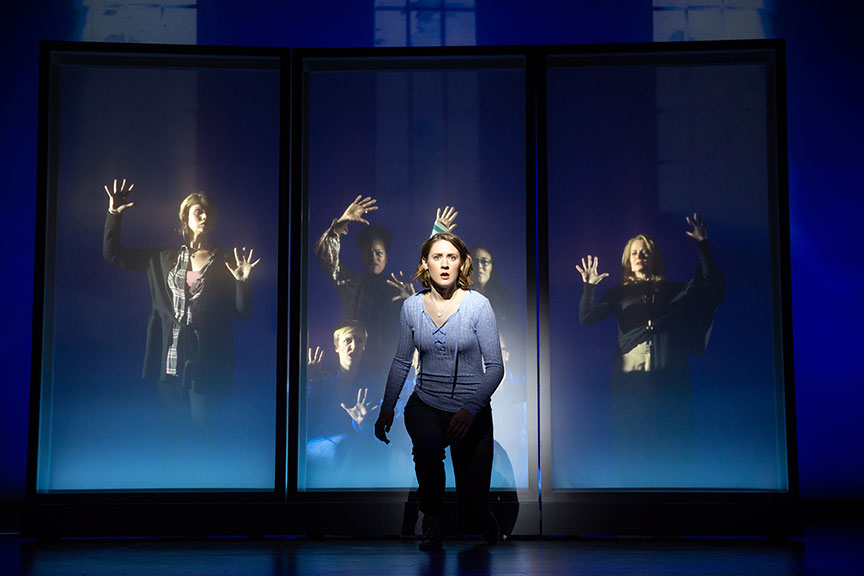|
Sophie Hearn in "Life After." Photo courtesy of Old Globe Theatre Alice Carter’s father is dead, just hours after their last conversation – a bitter, angry one. In the 16-year-old girl’s shock and torment, she blames herself. In Britta Johnson’s promising new musical Life After, however, the teenager’s search for answers to the unanswerable lead her in directions she never imagined.
The entirety of Life After is told through the prism of Alice’s anxieties, self-recriminations and grief. When Alice (Sophie Hearn) isn’t expressing these feeling herself in words or in song, they are manifested through her perceptions of her older sister (Charlotte Maltby), her mother (Mamie Parris), her friend Hannah (Livvy Marcus) or through three omnipresent singers (dubbed by the playwright The Furies) who sound out Alice’s conscience and suspicions. Because Life After reflects the attitudes and emotional instability of a teenager, it’s able to venture over the top at times and even rely on humor in an otherwise dark context. Under the direction of Barry Edelstein, the Old Globe is presenting the U.S. premiere of the Canadian Johnson’s play, which opened in and received acclaim in Toronto. The plaudits are justified. Johnson wrote not only the book but the music and lyrics for Life After, and while only one of its numbers, the show-closing “Poetry,” stands out, the remainder do advance and add layering to the story. The theme of forgiveness of self and of others, especially loved ones, resides in the heart of Life After’s songs. Though Alice seems eloquent and wise beyond a girl of 16, she is a sympathetic and searching protagonist, and the expressive Hearn is well cast in the role. Bradley Dean inhabits with verve the larger-than-life part of Alice’s father, Frank, whose self-help books have made him a media star while taking him away from his family. Shining in support are Maltby as blunt sister Kate and Marcus for providing comic relief opposite Alice’s sadness and doubts. At a crisp 90 minutes and with an imaginative physical staging that has the both sparse set and its characters in perpetual motion, Life After never stops to wallow or, ironically, to contemplate what does come after death. Its focus is on the ones left behind to make peace with those gone and within themselves. (Review originally published in San Diego CityBeat on 4/10/19.)
0 Comments
Leave a Reply. |
AuthorDavid L. Coddon is a Southern California theater critic. Archives
July 2024
Categories |
David Coddon |
|
